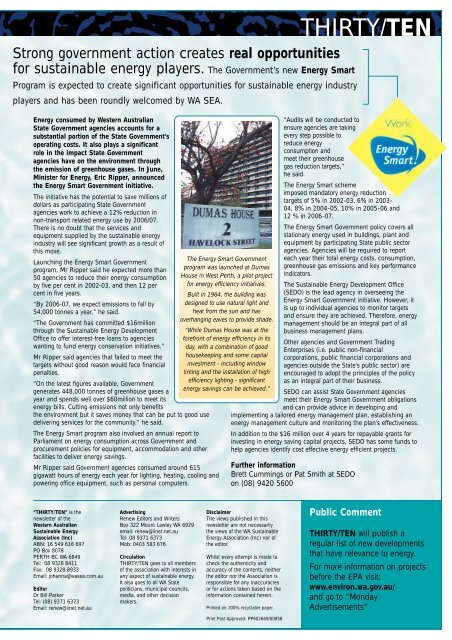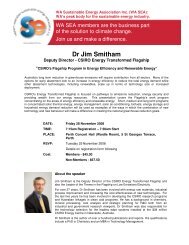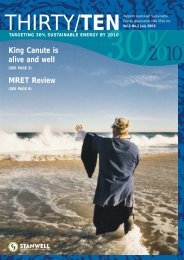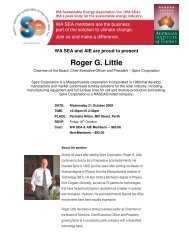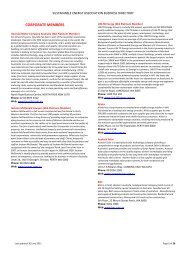THIRTY/TEN
The water crisis - Sustainable Energy Association
The water crisis - Sustainable Energy Association
- No tags were found...
You also want an ePaper? Increase the reach of your titles
YUMPU automatically turns print PDFs into web optimized ePapers that Google loves.
Strong government action creates real opportunities<br />
for sustainable energy players. The Government’s new Energy Smart<br />
Program is expected to create significant opportunities for sustainable energy industry<br />
players and has been roundly welcomed by WA SEA.<br />
Energy consumed by Western Australian<br />
State Government agencies accounts for a<br />
substantial portion of the State Government’s<br />
operating costs. It also plays a significant<br />
role in the impact State Government<br />
agencies have on the environment through<br />
the emission of greenhouse gases. In June,<br />
Minister for Energy, Eric Ripper, announced<br />
the Energy Smart Government initiative.<br />
The initiative has the potential to save millions of<br />
dollars as participating State Government<br />
agencies work to achieve a 12% reduction in<br />
non-transport related energy use by 2006/07.<br />
There is no doubt that the services and<br />
equipment supplied by the sustainable energy<br />
industry will see significant growth as a result of<br />
this move.<br />
Launching the Energy Smart Government<br />
program, Mr Ripper said he expected more than<br />
50 agencies to reduce their energy consumption<br />
by five per cent in 2002-03, and then 12 per<br />
cent in five years.<br />
“By 2006-07, we expect emissions to fall by<br />
54,000 tonnes a year,” he said.<br />
“The Government has committed $16million<br />
through the Sustainable Energy Development<br />
Office to offer interest-free loans to agencies<br />
wanting to fund energy conservation initiatives.”<br />
Mr Ripper said agencies that failed to meet the<br />
targets without good reason would face financial<br />
penalties.<br />
“On the latest figures available, Government<br />
generates 448,000 tonnes of greenhouse gases a<br />
year and spends well over $60million to meet its<br />
energy bills, Cutting emissions not only benefits<br />
the environment but it saves money that can be put to good use<br />
delivering services for the community.” he said.<br />
The Energy Smart program also involved an annual report to<br />
Parliament on energy consumption across Government and<br />
procurement policies for equipment, accommodation and other<br />
facilities to deliver energy savings.<br />
Mr Ripper said Government agencies consumed around 615<br />
gigawatt hours of energy each year for lighting, heating, cooling and<br />
powering office equipment, such as personal computers.<br />
The Energy Smart Government<br />
program was launched at Dumas<br />
House in West Perth, a pilot project<br />
for energy efficiency initiatives.<br />
Built in 1964, the building was<br />
designed to use natural light and<br />
heat from the sun and has<br />
overhanging eaves to provide shade.<br />
“While Dumas House was at the<br />
forefront of energy efficiency in its<br />
day, with a combination of good<br />
housekeeping and some capital<br />
investment - including window<br />
tinting and the installation of high<br />
efficiency lighting - significant<br />
energy savings can be achieved.”<br />
<strong>THIRTY</strong>/<strong>TEN</strong><br />
“Audits will be conducted to<br />
ensure agencies are taking<br />
every step possible to<br />
reduce energy<br />
consumption and<br />
meet their greenhouse<br />
gas reduction targets,”<br />
he said.<br />
The Energy Smart scheme<br />
imposed mandatory energy reduction<br />
targets of 5% in 2002-03, 6% in 2003-<br />
04, 8% in 2004-05, 10% in 2005-06 and<br />
12 % in 2006-07.<br />
The Energy Smart Government policy covers all<br />
stationary energy used in buildings, plant and<br />
equipment by participating State public sector<br />
agencies. Agencies will be required to report<br />
each year their total energy costs, consumption,<br />
greenhouse gas emissions and key performance<br />
indicators.<br />
The Sustainable Energy Development Office<br />
(SEDO) is the lead agency in overseeing the<br />
Energy Smart Government initiative. However, it<br />
is up to individual agencies to monitor targets<br />
and ensure they are achieved. Therefore, energy<br />
management should be an integral part of all<br />
business management plans.<br />
Other agencies and Government Trading<br />
Enterprises (i.e. public non-financial<br />
corporations, public financial corporations and<br />
agencies outside the State’s public sector) are<br />
encouraged to adopt the principles of the policy<br />
as an integral part of their business.<br />
SEDO can assist State Government agencies<br />
meet their Energy Smart Government obligations<br />
and can provide advice in developing and<br />
implementing a tailored energy management plan, establishing an<br />
energy management culture and monitoring the plan’s effectiveness.<br />
In addition to the $16 million over 4 years for repayable grants for<br />
investing in energy saving capital projects, SEDO has some funds to<br />
help agencies identify cost effective energy efficient projects.<br />
Further information<br />
Brett Cummings or Pat Smith at SEDO<br />
on (08) 9420 5600<br />
“<strong>THIRTY</strong>/<strong>TEN</strong>” is the<br />
newsletter of the<br />
Western Australian<br />
Sustainable Energy<br />
Association (Inc)<br />
ABN: 16 549 616 697<br />
PO Box 8078<br />
PERTH BC WA 6849<br />
Tel: 08 9328 8411<br />
Fax: 08 9328 8933<br />
Email: johanna@wasea.com.au<br />
Editor<br />
Dr Bill Parker<br />
Tel: (08) 9371 6373<br />
Email: renew@iinet.net.au<br />
Advertising<br />
Renew Editors and Writers<br />
Box 322 Mount Lawley WA 6929<br />
email: renew@iinet.net.au<br />
Tel: 08 9371 6373<br />
Mob: 0403 583 676<br />
Circulation<br />
<strong>THIRTY</strong>/<strong>TEN</strong> goes to all members<br />
of the association with interests in<br />
any aspect of sustainable energy.<br />
It also goes to all WA State<br />
politicians, municipal councils,<br />
media, and other decision<br />
makers.<br />
Disclaimer<br />
The views published in this<br />
newsletter are not necessarily<br />
the views of the WA Sustainable<br />
Energy Association (Inc) nor of<br />
the editor.<br />
Whilst every attempt is made to<br />
check the authenticity and<br />
accuracy of the contents, neither<br />
the editor nor the Association is<br />
responsible for any inaccuracies<br />
or for actions taken based on the<br />
information contained herein.<br />
Printed on 100% recyclable paper.<br />
Public Comment<br />
<strong>THIRTY</strong>/<strong>TEN</strong> will publish a<br />
regular list of new developments<br />
that have relevance to energy.<br />
For more information on projects<br />
before the EPA visit:<br />
www.environ.wa.gov.au/<br />
and go to “Monday<br />
Advertisements”<br />
Print Post Approved: PP602669/00858


